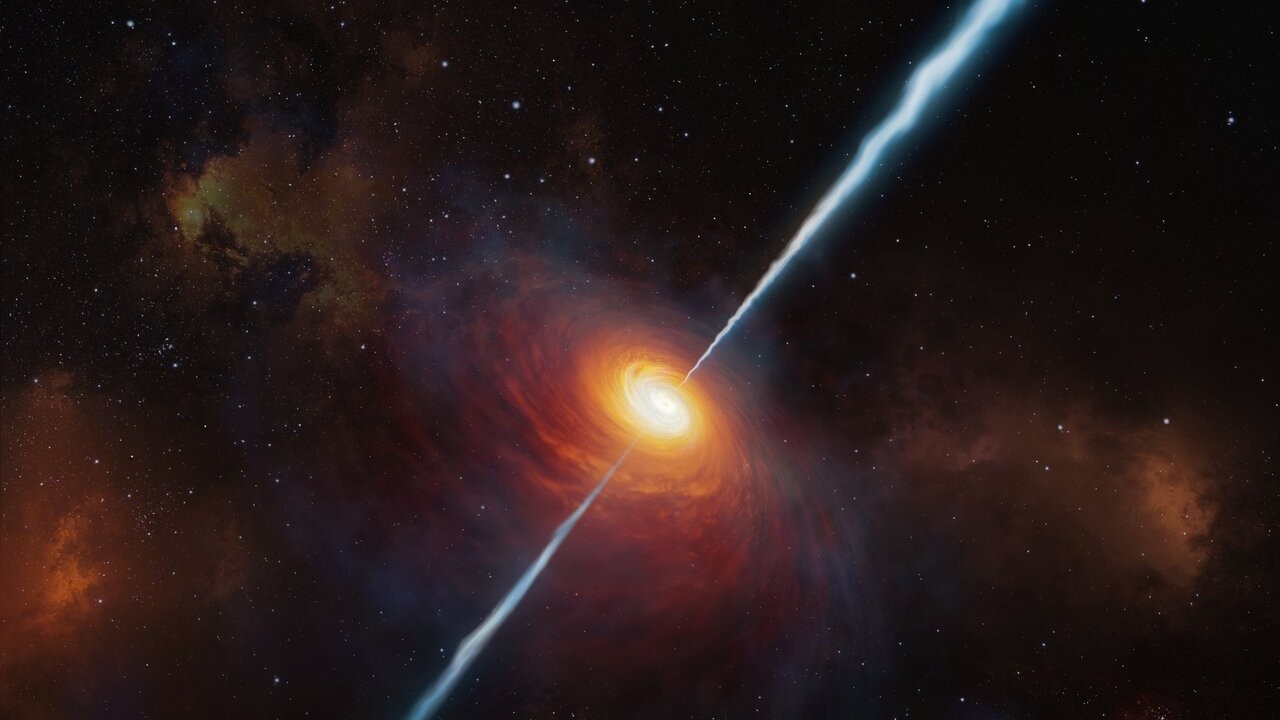
Time has been observed passing more slowly in quasars in the early universe.
The observed time dilation comes as a consequence of Albert Einstein's theory of general relativity combined with the expansion of space. "At its heart, this is another 'Einstein is right again' story," Geraint Lewis, a cosmologist at the University of Sydney, told Space.com.
Lewis and Brendon Brewer of the University of Auckland are co-authors on a new paper describing the long-sought after confirmation of time dilation effects in the variability of quasars. A quasar is powered by an accreting supermassive black hole at the heart of an extremely active galaxy. Because the accretion disk around the black hole is relatively small, fluctuations in the light emitted by the quasar can take place in just days. This makes them easier to track.
However, in the time since the light, and its fluctuations, was emitted from the 12 billion-year-old quasars, the universe has expanded greatly. This means that we are seeing the quasars as they existed over 12 billion years ago.
"We expected quasars to also exhibit this behavior, but previous searches had failed to find it," said Lewis.
Related: What is the theory of general relativity?
A new sample of 190 high-redshift quasars observed over 20 years by the Sloan Digital Sky Survey (SDSS), Pan-STARRS and the Dark Energy Survey, has provided Lewis and Brewer with the tools to finally detect time dilation in the variability of quasar light. The long period of observations coupled with telescopic sensitivity to the quasar fluctuations reveals the time dilation effect. Based on how slowly the fluctuations seem to be occurring, time in these quasars appears to run five times slower than it does for us in our frame of reference on Earth.
"We can pin-down the characteristics of their variability and show that quasars truly play ball with the cosmos," said Lewis.
To be clear, time didn't really run slow in those quasars relative to everything around them — in their frame of reference, time ran normally. Einstein's theory of relativity and how he described the passage of time is based on the concept of frames of reference, and that these frames can be distinguished by their velocity relative to each other.
"The motion of distant galaxies is due to expanding space," said Lewis. Consider that the Hubble constant describes how fast a volume of space 3.26 million light-years across is expanding per second. This is an incremental effect, where the expanding volumes of space add up. The farther a galaxy is from us, the more space has expanded between the galaxy and us, and the faster that galaxy seems to be moving away from us.
"Some of these quasars were moving faster than the speed of light, relative to us, when the photons were emitted," said Lewis.
As Einstein showed, strange things happen when you approach the speed of light. One of these strange things is time dilation. A stationary observer on Earth would observe a clock traveling faster than them, whether on a spacecraft or in a quasar, appear to slow down. The faster the clock is moving, the greater the effect. At velocities approaching the speed of light, the effect is dramatically pronounced, resulting in peculiarities such as the twin paradox.
Time dilation is not just theoretical. It has been observed, albeit in tiny amounts, in satellites orbiting the Earth — the Global Positioning System has to take this into account. Cosmologically, time dilation has been observed in supernovae that exploded 6 to 7 billion years ago, but never in objects more distant than that until now.
Besides being another successful test of Einstein's theory of relativity, the time dilation observed in the quasars is also further evidence that we do indeed live in a universe that is expanding as a result of the Big Bang. If the universe were not expanding, the quasars would not appear to be moving at relativistic speeds relative to us. Lewis described the findings as "putting to bed some of the more extreme ideas that had been proposed, including that cosmologists have it all wrong, due to the previous failure to see quasar time dilation."
The research was published on 30 June in Nature Astronomy.







